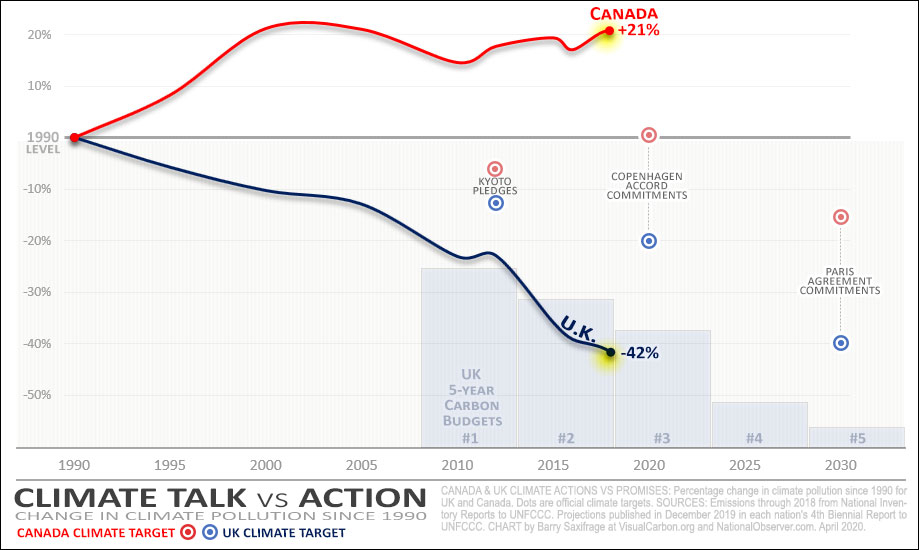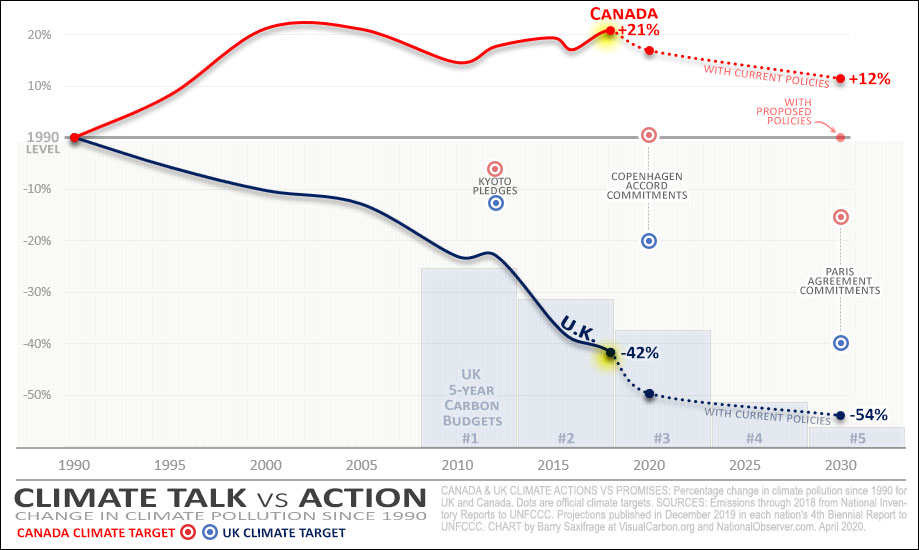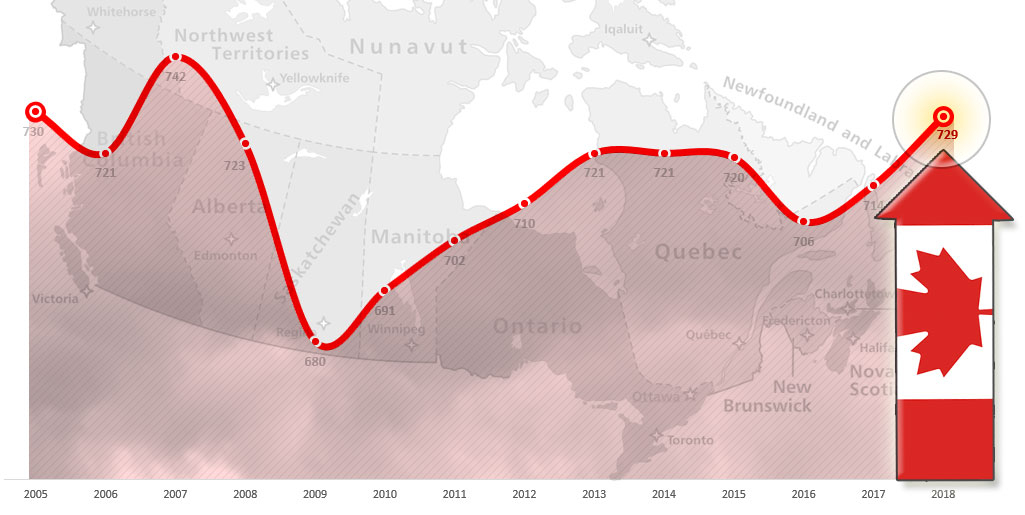Support strong Canadian climate journalism for 2025
It's that time of year again, when countries release their updated climate pollution inventories. This is when aspirational climate promises get measured against real-world pollution levels.
And for Canada, the latest results are terrible. The new data show that in 2018, our annual emissions rose yet again. This time, by a depressingly large 15 million tonnes of CO2 (MtCO2). As my chart below shows, we are now emitting 729 MtCO2 per year — our highest level in more than a decade. Worse still, we've now erased all the progress we've made toward our international climate targets. We are now emitting the same amount of climate pollution as we did back in our 2005 baseline year. Thirteen years — zero progress toward our targets.
Worse still, we've now erased all the progress we've made toward our international climate targets. We are now emitting the same amount of climate pollution as we did back in our 2005 baseline year. Thirteen years — zero progress toward our targets.
We don't have to keep failing. Climate failure is a choice. We could choose climate success instead. For example, one thing we could quickly do is adopt the climate tool kit used successfully by our Commonwealth peer, the United Kingdom.
The U.K. emissions are shown as the blue line on the chart. The U.K. has a much larger population and much larger economy than we do. (In fact, both are nearly double our size.) So, it's not surprising that back in 1990, they also emitted far more climate pollution than we did. Now, as the chart makes clear, they emit far, far less than we do.
While we've been busy increasing emissions by 125 MtCO2 per year, the U.K. has been cutting theirs by 330 MtCO2. The resulting climate-action gap between our two major economies is rapidly approaching half a billion tonnes per year.
Promises versus actions
Canadian and U.K. governments have both been making high-profile international climate commitments for decades. My next chart lets you see how each nation is living up to their promises.
The blue bull's-eyes show major U.K. targets. For example, under the global Copenhagen Accord, they promised to cut their emissions to 20 per cent below their 1990 level by 2020. As you can see, they've already cut twice as much.

Canada's targets are shown by the red bull's-eyes. Our Copenhagen Accord target is 17 per cent below our 2005 level. That works out to just above our 1990 level. Despite setting a much higher target, we've never come anywhere close to meeting it. Instead, we've increased our annual emissions by 50 MtCO2 since we made our Copenhagen promise a decade ago.
So, what is the U.K. doing differently that we could adopt?
Carbon Budget tool kit
More than a decade ago, the U.K. passed a broad climate policy tool kit called the Climate Change Act 2008, also known as the "Carbon Budget" law. Here are four key things it does that Canada's climate policy still does not.
Key 1: It requires a plan
To start with, the law legally requires the U.K. government to create plans to meet all its climate targets. Hey, making a plan to reach your goal seems like an obvious thing to do, right?
But, while Canadian politicians regularly self-proclaim themselves to be climate leaders, the reality is that in 30 years of setting climate targets, Ottawa has never yet produced a plan to meet any of them.
The table on the right shows nine climate targets promised by Canadian governments. The Mulroney government set the first two back in 1988 and 1990.  The Chrétien government followed with two more, the most famous being our Kyoto Accord target set in 1997. Then, the Harper government followed with two increasingly weaker targets — "Turning the Corner" in 2007 and our Copenhagen Accord target in 2009. In 2016, the current Trudeau government set our Paris Agreement target.
The Chrétien government followed with two more, the most famous being our Kyoto Accord target set in 1997. Then, the Harper government followed with two increasingly weaker targets — "Turning the Corner" in 2007 and our Copenhagen Accord target in 2009. In 2016, the current Trudeau government set our Paris Agreement target.
Nine climate targets. Thirty years. Zero plans produced to meet any of them.
For example, it's now been four years since Ottawa pledged Canada's 2030 Paris Agreement target. And, as we will see in more detail below, the government's own projections show that all their current and proposed policies won't get us anywhere close to the target.
Adopting the U.K. Carbon Budget tool kit would be a gigantic climate leap forward in Canada just from the requirement that Ottawa must produce a plan to meet its targets.
Key 2: Acting soon enough
A second critical benefit of the U.K. Carbon Budget law is that it requires government to act "at least 12 years in advance to allow policy-makers, businesses and individuals enough time to prepare."
Canadians would hugely benefit from having the luxury of such long lead times. As it is, we only have 10 years remaining to our 2030 climate target, and the neither the public nor the private sectors know what will be required of them. What we do know is that we have a still growing pile of emissions to cut, a rapidly deteriorating climate system increasing the urgency and a rapidly shrinking timeline in which to cut our pollution down to safe and sustainable levels.
Key 3: An independent committee
To remove politics from the process as much as possible, the U.K. tool kit includes an independent Committee of Climate Change (CCC). As their website explains, "the CCC was set up to ensure emissions targets are set based on expert independent assessment of the evidence and to monitor the U.K.’s progress toward meeting the targets." The committee does the heavy lifting and then brings proposals for carbon budgets and the policies that could be used to meet them to the government to vote on. Then, the CCC makes sure the government of the day follows through.
Removing climate policy from political whiplash would make it far easier for Canadian individuals and businesses to plan ahead efficiently. It would help eliminate the chaotic policy reversals that come with each change in government. For example, as prime minister, Stephen Harper was famously opposed to carbon pricing: "Anybody who tells you that a carbon tax is an environmental policy is trying to pull the wool over your eyes." A few years later, the new Trudeau government switched Ottawa's focus to put carbon pricing at the centre of Canada's climate policies. The Conservative opposition threatens to eliminate the policy when they get back in power.
Key 4: Carbon budgets that cover all emissions in all years
At the heart of the U.K. Climate Change Act tool kit is the concept of "carbon budgets." The law requires the U.K. to set legally binding five-year carbon budgets. These must include all emissions in every year. These budgets are a critical tool to keep the country on track.
You can see the U.K.'s quarter-century of already-legislated carbon budgets as blue boxes on my chart below. And you can also see how their past emissions follow them down. Notice also that they already have policies in place that meet the next 10 years of carbon budgets.

Meanwhile, in Canada…
Now, take a look at where Canada is headed under our current policies. That's the dotted red line I've added to the chart. Our current policies won't get us anywhere close to our 2020 or 2030 climate commitments.
And Canada's promised suite of additional "proposed" policies won't either. See that red dot in 2030 labelled "with proposed policies?" That's Ottawa's own projection released just a few months ago in their Fourth Biennial Report to the United Nations. Not. Even. Close.
And that dot generously assumes that all the "proposed" policies actually get enacted — and on time. In Canada, that certainly isn't a given, considering past political promises made and unmet:
- "We will continue to do what we have to do to meet our Kyoto obligations" — then-natural resources minister Joe Oliver.
- "Our government has a plan, a very good plan, to meet our target of reducing greenhouse gases by 17 per cent from 2005 base levels by 2020 … moving forward, we’re working toward achieving additional reductions from other sectors of the economy, focusing now on the oil and gas sector" — then-environment minister Peter Kent. After six years of promising regulations on the oil and gas sector, the Harper government eventually admitted they wouldn't do it. If there was a secret plan to meet our 2020 target, the public never got to see it and as the chart above makes clear, it was never enacted.
- "Based on our current climate plan, plus new initiatives we plan to undertake, our government is confident that we will meet and exceed our 2030 target" — current Environment and Climate Change Minister Jonathan Wilkinson in a recent statement to Canada's National Observer. So, does Ottawa really have a secret plan this time? If so, why can't Canadians see it? Which Canadians will need to cut extra emissions, by how much and by when? Where are the projections showing Canada meeting our targets?
If Ottawa adopted the U.K. Carbon Budget tool kit, then Canadians would know there really is a plan. We would get to see it. We would know far in advance what the policies will be and what our roles will be. We'd have carbon budgets for guardrails to keep us on a steady track. And we'd have independent experts doing the heavy lifting to remove much of the destructive political whiplash and antagonism we experience now.
What are we waiting for? How much deeper into the gathering climate storm are we going to keep flying blind and dangerously off course?
Climate pollution per person
Comparing entire countries can sometimes seem abstract. So, I'll wrap up with a chart comparing climate pollution per person.
 It shows that the Brits have cut their emissions per capita in half since 1990. They've dropped from 14 tonnes (tCO2) per person down to seven. That's getting close to the world average.
It shows that the Brits have cut their emissions per capita in half since 1990. They've dropped from 14 tonnes (tCO2) per person down to seven. That's getting close to the world average.
The British still have a lot of emissions to cut, including those uncounted by all countries — international flights and shipping, plus from imported and exported goods. But they are making real progress on the emissions that all countries are responsible for under international rules — direct emissions inside their country.
Canadians, in contrast, have cut little from our direct emissions in the past three decades. Since 1990, our pollution per capita has gone from 22 tCO2 to 20 tCO2. At this rate, it will take us centuries just to get to where the British are now. We currently pollute triple the global average. And despite being one of the world's "Dirty Dozen" climate polluters, both in total emissions and per capita, we haven't taken responsibility for our excesses by meeting our climate commitments — or even by creating a plan that meets them.
Instead, our emissions are still heading in the wrong direction.
Can we please adopt a U.K.-style Carbon Budget tool kit now?






Comments
promises vs action...
Excellent summary and prescription for change.
Across Canada, govts at all levels set climate targets that they have no intention of meeting. This has been the pattern for decades.
Canada's (mostly Alberta's) oil & gas sector grossly under-reports its emissions of all types. Canada's emission stats are fictional. Our emissions gap is actually worse than reported.
Sigh.
Job one in budgeting is to answer the question, "WHERE are we spending our money?" Car? Rent? Work-related? Leisure?
...and this article fails on that. WHERE are we spending our carbon budget? Cars? Houses? Airplanes?
Our numbers are high for general consumption because we are a spread-out country with more driving, more flying, but only a little high. Those really high numbers are not because we're still on coal (almost gone).
They're because of "work-related expenditures" ... we have high-carbon-output industries; mainly, we extract resources, we do not have a lot of factories, and "service jobs" are a lower component of our economy.
Barry is asking us to change the Canadian economy, and he should be specific about it. He of course believes we should stop extracting oil itself, and that would do a lot of it - but the cost of that in jobs is well-known, and much-protested. It's politically hopeless, and while railing about it may provide Barry with permanent employment, it's not going to accomplish a damned thing.
It may be accomplished by the global economy, but its doubtful. At the end of the day, most oil consumption will resume, the frackers will go broke before the tar sands, and transitioning the global energy infrastructure away from oil is the work of decades. It will involve massive industrial investment, not a stupid piece of paper with a "budget" on it.
Want to lower Canada's carbon consumption? Engineers like myself have made the internal combustion engine about 30% more efficient since the 1970's. Consumers responded by purchasing vehicles that weigh 30% more (mostly more SUVs in the mix, and vans) negating the gain. Furnaces have also become 30% or so more efficient, and consumers reacted by purchasing homes over 40% larger (1500 to 2500 sf), negating that advance as well.
Tax that stuff. It'll do more good, sooner, than trying to stop us from iron mining, or even outright carbon mining.
Roy Brander wrote: "we are a spread-out country with more driving, more flying"
Entitled Canadians justify their high emissions by resorting to the excuse that they live in a large country with cold winters.
The "spread-out country" argument is a better fit for the USA and China — nations populated from corner to corner. Unlike those extensively populated countries, most of Canada's population lives within 200 miles of the US border. Two thirds live in the Windsor – Quebec City corridor. Most trips are within 20 km of home. Most Canadians do not travel to the vast, empty North.
Cold winters and land area do not justify our massive ecological footprint, living beyond our means, and unsustainable lifestyles.
With just 4% of the world's population, the U.S. accounts for more than one fifth of global oil consumption. Gross inequity. Who lives a lot like Americans? Canadians.
Canada has the worst vehicle fuel economy in the world. Canada’s vehicles have the highest average fuel consumption and CO2 emissions per km driven (IEA). Canada’s vehicles are also the largest and the second heaviest in the world.
"When it comes to vehicles, Canada tops the charts for poor fuel economy" (The Conversation, May 8, 2019)
Many Canadians drive everywhere they go in single-passenger vehicles in sprawled cities. Idle at drive-thrus. Live far from work and school. Long commutes in bumper-to-bumper traffic. Lights and computers are left on in office towers and homes. Living in big houses stuffed with things they don't need. Shop till they drop. Single-use disposables. Fly around the world for vacations. Holiday in huge RVs. Eat a heavy meat diet. Throw out 40% of their food.
Canadians have a huge footprint because we are energy hogs and huge resource wasters, with extravagant consumption habits.
Canadians have countless opportunities to reduce discretionary energy use and waste.
Roy Brander wrote: "the cost of that in jobs is well-known"
Even as oilsands production rises, jobs go down, down, down, due to automation. Tens of thousands of Albertans lost their jobs in the last oil price crash (2014-15).
The only place Premier Kenney has managed to create jobs is in AB's War Room.
"Making a less energy intensive Alberta can create many jobs. Out of 56 economic sectors, oil and natural gas extraction are dead last in job creation — a measly 3.5 jobs for every $1 million invested."
"Alberta needs a low-carbon plan" (Rabble)
In Canada, environmental and clean technology jobs (including clean energy) exceed oil & gas jobs.
Nearly 300,000 Canadians were directly employed in clean energy in 2017 — nearly 100,000 more than in mining, quarrying, and oil-and-gas extraction.
"Clean energy one of Canada's fastest-growing industries" (Canadian Press)
"Job killer or job creator? Experts predict a climate employment boom " (CBC)
"Solar Employs More People In U.S. Electricity Generation Than Oil, Coal And Gas Combined" (Forbes)
Clean energy employment in the U.S. exceeds fossil fuel jobs nearly three-fold.
"Massive Job Counts Show Renewables, Efficiency Taking Hold in ‘Every U.S. Zip Code’" (The Energy Mix)
If renewables can create jobs in Republican states, they can create jobs anywhere — even in AB.
Investment and jobs in the burgeoning renewable energy and sustainability sector are surely preferable to no jobs in a sunset oil & gas & coal industry that is rapidly shedding them.
We can either manage the decline of fossil fuels ourselves or let the global market do it for us.
Over-reliance on a single commodity increases AB's and Canada's economic risk.
AB's oil industry is at the mercy of global oil markets. AB gets hammered every time the oil price crashes. Massive job losses. Huge holes in AB's budget and loss of services. Alberta's dependence on oil is its undoing, not its strength.
Insanity is doing the same thing over and over again, expecting different results. How many more times shall we watch AB's economy collapse? Give us a number.
Time to get off the fossil fuel rollercoaster.
Roy Brander wrote: "It will involve massive industrial investment"
The shift is underway. Building new wind or solar capacity now costs less than adding the equivalent in coal or gas plants in two-thirds of the world." (Bloomberg)
In the power sector, investment in NEW renewables has exceeded investment in NEW fossil fuel projects for a decade — starting around 2010.
In 2019, the world financed $282 billion of renewable capacity.
"Renewable investment already dwarfs the estimated $100 billion of new finance for coal and gas power in 2019.
https://www.bloomberg.com/graphics/climate-change-data-green/investment…
"Oil Companies Are Collapsing, but Wind and Solar Energy Keep Growing" (NY Times, April 7, 2020)
https://www.nytimes.com/2020/04/07/business/energy-environment/coronavi…
"Britain produces more electricity from zero-carbon sources than fossil fuel plants in 2019" (Thomson Reuters, Dec 31, 2019)
Around the world, the fossil fuel industry does everything in its power to perpetuate demand: by funding climate change denial campaigns and blocking alternatives. Predatory delay.
-Big Oil spent millions of dollars on a campaign to defeat a carbon tax plan in Washington State.
-Fossil fuel and utility companies spend millions of dollars on lobbyists to shut out renewables from the market.
-Millions of dollars more on climate-change-denial campaigns using Big Tobacco's playbook.
-Millions more on lobbying to delay or weaken regulations.
-Milking govts for endless subsidies.
I couldn't agree more with Roy Brander on the need to price (tax) carbon properly. All goods and services must be priced properly so consumers can make rational, sustainable choices.
Put a realistic price on carbon, internalize health and environmental costs, pay all damages, end all subsidies, invest in energy alternatives — and watch what happens.
Fail to price carbon properly, and the problem will never be solved.
While we're struggling to get off the "getting worse in all directions" map, perhaps it might be considered that most utter need for travel is ... not. Witness how many can get along during lockdown.
Perhaps we need to redefine necessary, and then restrict ourselves to the necessary till we start seeing progress on the warming numbers.
Yeah: completely offensive. UnCanadian. Anti-Albertan. Irrational. As though what we're doing at the moment is not ...
Well, that was a lot of wiggle room to continue on our course but step on the gas and hit the methane clathrate tipping point earlier than currently estimated.
On "making the internal combustion engine 30% more efficient" since the 70s, GM announced last week that it had a breakthrough the development of a million mile battery, and without expensive cobalt. They believe some of their EVs will be equal with combustion cars in price, and therein the consumer will soon have a no-brainer choice considering the far more efficient and lower operating costs of EVs. Some GM models will also have a range of almost 1,000 km (600 miles). Tesla is about to release their million mile battery as well. EVs will do more to destroy oil demand than currently admitted in Alberta. That will probably afford at least a dip in Barry's graphs in future if not a downward trend. The key here is that economic trends, not necessarily government policy, will do the heavy lifting to reduce emissions from transportation.
Conservation tillage accompanied by nutrient-fixing and carbon absorbing cover crops have already worked climate-fighting miracles in Saskatchewan from 1985-2016, notably in soil and plant absorption of carbon and overall GHG reductions. Moreover, crop yields were much higher because the soil structure and moisture retention was built up. See reference and excerpt below. One op-ed calculated that the decrease was equivalent to taking 3.4 million cars off the road, more than twice the number of cars in Metro Vancouver.
Yes, we need to tax the hell out of excessive energy and resource consumption. My favourites would include: a steep, exponential federal tax per 100 kg of combustion vehicle weight above a preset floor (commercial vehicles rated lower); working with cities to adopt Smart Growth practices in their land use zoning in exchange for vastly increased transit construction with higher frequency service; actual consultation to develop a genuine Transition Plan that includes the electrification of the domestic economy and building stuff like high-speed rail corridors doubling as clean energy corridors, wind and solar power purchases along the corridors, better grants for furnace conversions to electric air pumps, better building codes, and so forth. ALL of these measures would in my view be ideal candidates for pandemic recovery stimulus.
It's easy if you try.
MEASURING GREENHOUSE GAS EMISSIONS IN THE SASKATCHEWAN CROP SECTOR
Lana Awada APAS, April 2, 2019
Conclusions:
Adoption of sustainable farming practices increased carbon sequestration and reduced net GHG emissions
• Carbon sequestration increased from 0.26 in 1985, to 5.3 in 2005, and to 9Mt CO2-eq in 2016
• Decrease in net GHG emissions: which went from 5Mt CO2-eq in 1985, to 0.9 in 2005, and to 0.1Mt CO2-eq in 2016
• This decrease exceeds, by multifold, Canada’s commitment toward COP21 to cut GHG emissions by 30% below 2005 emissions by 2030.
• The great efforts by the SK farmers since the 1985 should be recognized and compensated, as a large amount of carbon was mitigated before 2005.
• The results of this study provide evidence that might support the design of policies that encourage the adoption of sustainable practices to mitigate GHG emissions in agriculture
OK WOW !
Thank you for bringing this good news from SK back up to the surface. there is still way to much of the "farmers are destroying the land" meme in green literature that advocates going back to 18th century farming practices in stead of going forwards, past 19th century dust-bowl style farming to something more sustainable. As an aside, where do all us tofu eaters get our soya beans? SK!.
Emergency budgetting starts with "what we've got" against "what we need" and then the exercise proceeds by conserving what we've got and reducing what we need. It includes emergency preparedness and stock.
The tar sands has been broke for some time, whether you're counting impossible liabilities for cleanup, essentially unfixable ecological damage, overruns of carbon budget share, undercounting of and underconcern about methane leakage, etc. etc. etc. Some of those stats are available, and some of them rendered into clear graphs by Mr. Saxifrage himself.
As for the political hopelessness of a green and just transition? Have you read polls much lately? Even in Alberta?
As for where "we" are spending "our" carbon budget, and by how much, it seems pretty clear that in some part as individuals we have little choice. We all must heat our homes, store and cook food, and use at least task lighting indoors especially in winter. Everyone can drive less, use a smaller vehicle, and leave the flying to the birds.
We're notoriously good at giving the big polluters a free ride and taxing carbon is just what the polluters ask for because it's the captive end-user who has to pay. Taxing only works at the frontend source where prices are set. For obvious reasons.
Meantime, the carbon tax is a huge proportion of gas heating cost.
Agreed about SUVs. Guess who lobbied to have them included in a class of I think it was agricultural vehicles ... though it could have been industrial.
The charm was that they would purportedly go where nothing else would go (fulfilling alter-ego iconoclasm) and could get out of any problem (pulling on the safety strings, maybe, but probably more as a bail-out measure, for those who'd done stupid things).
But the jobs in oil are going anyway. They've been leaving since 2014. Workers are more and more being replaced by (fossil carbon-fuelled) machines. Investors are leaving. Lenders are leaving. Insurers are leaving. The harvesting license holders themselves are leaving.
So that's a straw dog argument.
A very good article on UK action versus the action taken by Canada.
The comments posted here are more words with limited call to action on the part of our governments. The key message in the article "A plan is required".
The UK passed the "Climate Change Act 2008". What has Canada done in this area nothing. Just a lot of words. The UK act requires a budget item for Carbon reduction. The government took the step to set up an "Independent Climate Change Committee". What has Canada done in either of these two areas, not much. We have a Minister in change of the Environment - what does that give, little or not public involvement. No information for the public on a measurable target for each person to act on. Biggest action item by our federal government "Carbon Tax".
The message in this article is clear -"If there is no Plan, no Carbon budget, no independent committee to independent of the government no progress will ever be made to reduce the Carbon foot print".
The current Liberal Government lead by Justin Trudeau is reluctant to propose or pass legislation like the UK "Climate Change Act 2008". Why, "Trudeau does not like criticism. He is more interested in a seat in UN Security Council.
The opposition Parties with little exception are no better. They all need a kick the butt.
I realize that this is mostly irrelevant to the article's message, but you list 'Mulroney (Lib)'. I think not.
Today Aaron Wherry echoed Barry Saxifrage's call for a national carbon budget similar to legislation in the UK. Keep up the good work, National Observer - you're leading this conversation!
https://www.cbc.ca/news/politics/climate-change-emissions-canada-trudea…
Hi Barry: Mulroney has never been a Liberal!